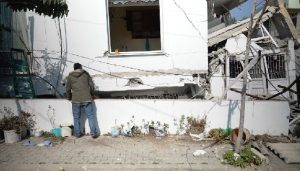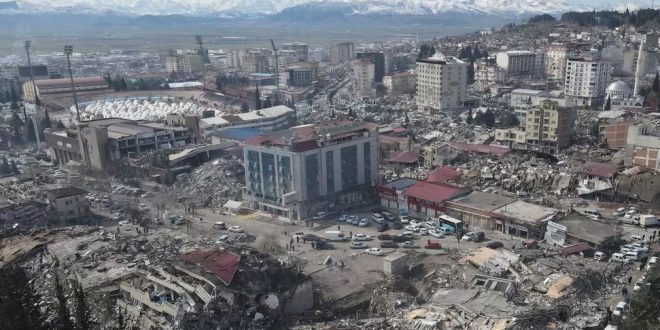13-03-2023
ISTANBUL: The crack in Mesut Muttaliboglu’s bedroom wall is so wide, he can fit a car key into it.
He turns it sideways, and with a flick of his wrist, a large chunk of plaster flies off the wall and crashes to the ground.
 It’s why he and his family are moving out of the flat they’ve lived in for the last 15 years. The whole building has been condemned after failing an earthquake safety test. There’s a very high chance that a tremor would bring this whole block crashing to the ground.
It’s why he and his family are moving out of the flat they’ve lived in for the last 15 years. The whole building has been condemned after failing an earthquake safety test. There’s a very high chance that a tremor would bring this whole block crashing to the ground.
The two powerful earthquakes in Turkey’s south that claimed almost 50,000 lives have brought a new urgency to its biggest city. Home to 15 million people, it sits on the North Anatolian fault line, and experts predict it’s due its own major earthquake before 2030.
Around 70% of the city’s buildings were built before rule changes that enforced stricter construction standards in 1999, and so are considered potentially unsafe. Just three months ago, a study said a quake here could kill up to 90,000 people. Now, the race is on to get the city ready.
Mesut knows all too well the devastation a quake can cause. He’s just returned from the epicentre in the southern city of Kahramanmaras, where he lost relatives. As we talked in his now-empty flat, he described the moment he found out.
“It happened at 04:17, a relative called and we all woke up screaming.” Mesut’s face crumples into tears and he  turns away to compose himself. “It’s a horrible situation. We couldn’t get (to Kahramanmaras) for three days because of snow, and when we reached the rubble it was so hard. I can’t describe it. I hope God doesn’t make anyone else experience this.”
turns away to compose himself. “It’s a horrible situation. We couldn’t get (to Kahramanmaras) for three days because of snow, and when we reached the rubble it was so hard. I can’t describe it. I hope God doesn’t make anyone else experience this.”
When Mesut returned to Istanbul, the authorities had shut off power and water to his flat. “I asked for them back again just so we could move. They gave me two more days.”
“The municipality had sent us written warning about it, but the situation wasn’t resolved due to rejections from the neighbors. We knew that our utilities were going to be shut off, and we were ready to leave here, but then the quake happened and it all became a shambles.”
Since the earthquakes in the south, there’ve been more than 100,000 new applications to the Istanbul municipality for building safety checks. The waiting list for one shot up to three months, then four, and it keeps rising.
Tenants as well as landlords can now apply, but some still don’t because of the financial implications. The compensation to help those who need to move out of condemned buildings is low. There are no official numbers showing how many fail the test.
 The city’s mayor, Ekrem Imamoglu, has promised more training for rescue teams, and preparation of temporary shelters that could house up to 4.5 million people in the aftermath of a quake. But many fear it still isn’t enough.
The city’s mayor, Ekrem Imamoglu, has promised more training for rescue teams, and preparation of temporary shelters that could house up to 4.5 million people in the aftermath of a quake. But many fear it still isn’t enough.
A walk down an average Istanbul Street tells you why. Many of the buildings have particular design features that can make them collapse if they’re put under pressure during a quake.
Dr Kurtulus Atasever, a structural and earthquake engineer, met me to point some of them out. We stood on an empty patch of ground, strewn with rocks that used to be the foundations of a building. When a magnitude 5.8 quake hit Istanbul in 2019, it was so badly damaged it had to be knocked down. Up and down the street, its neighbours have many of the same flaws. (Int’l Monitoring Desk)
 Pressmediaofindia
Pressmediaofindia




